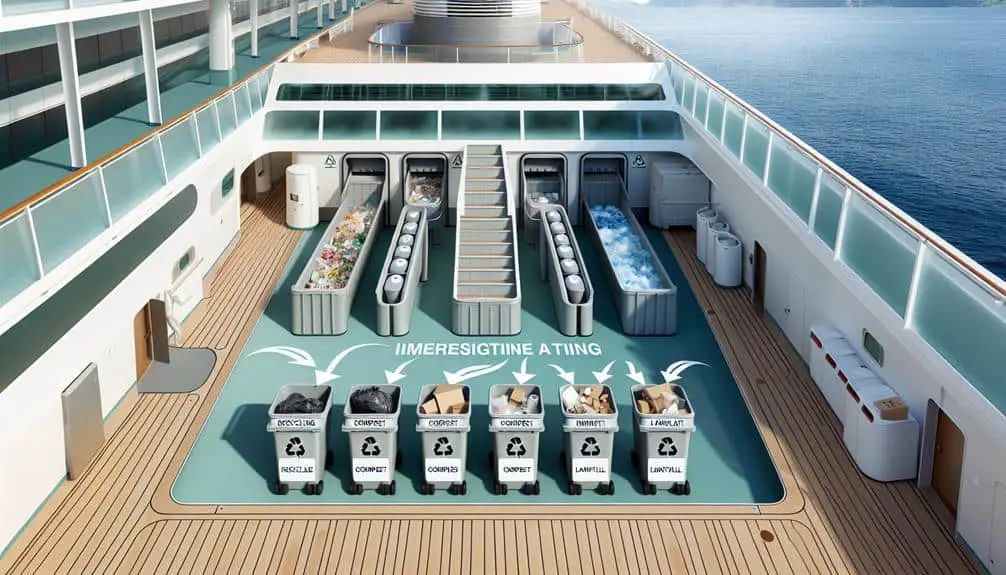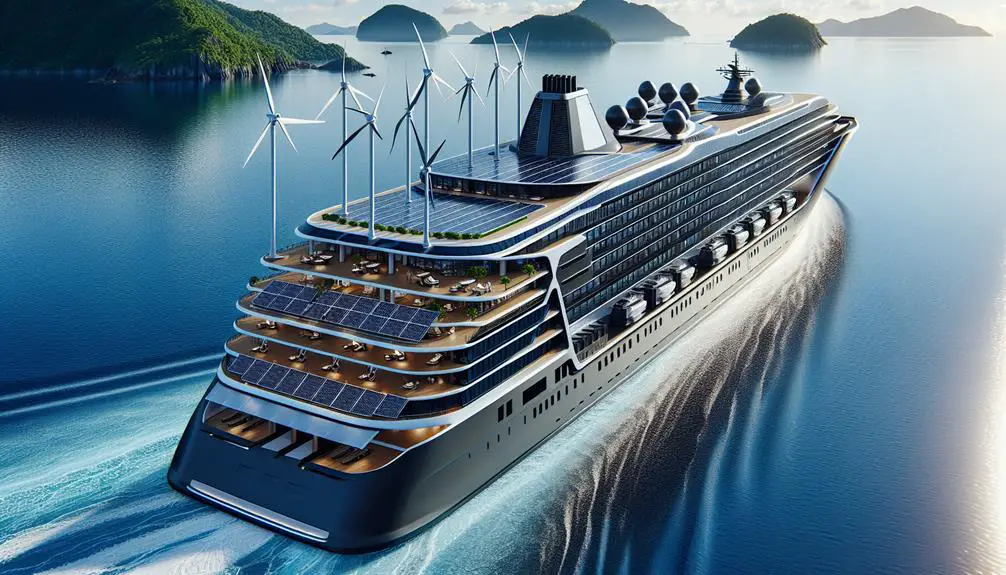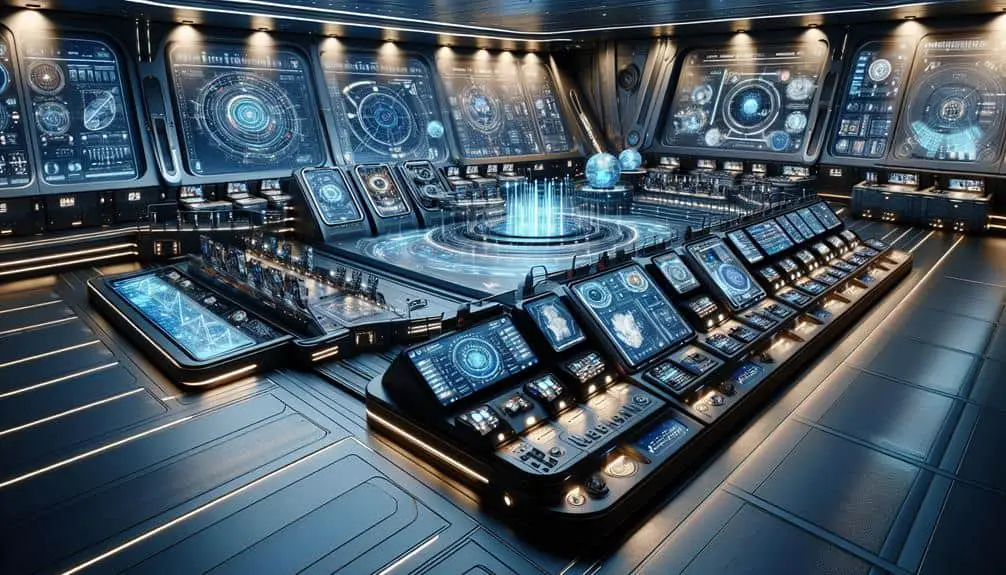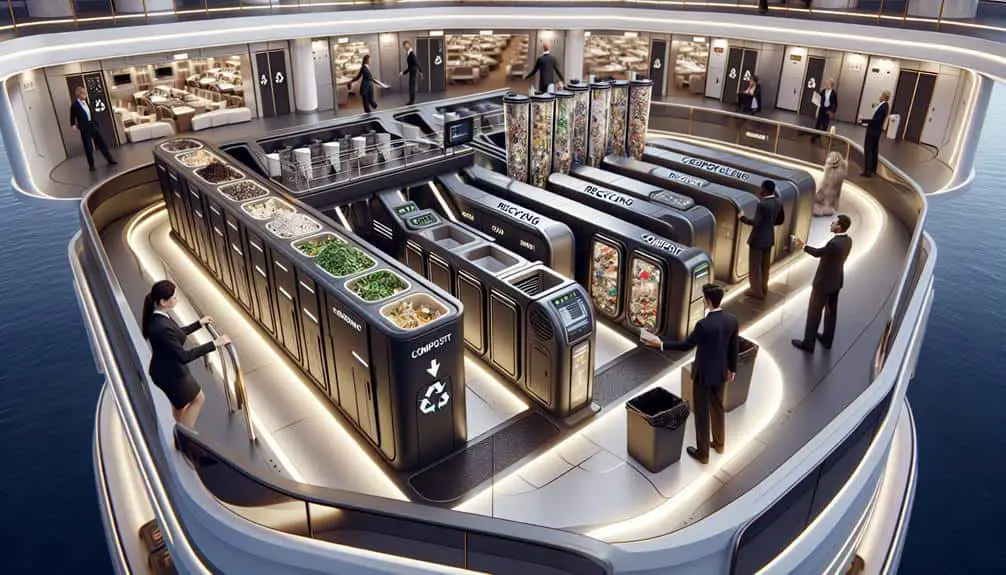Enhance sustainability on cruises with cutting-edge waste sorting solutions. Utilize smart sensors to monitor and optimize waste collection efficiently. Robotic sorting technology enhances recyclable materials separation. Implement high-tech recycling initiatives with RFID smart bins and AI-powered robotic sorters. Explore AI technologies for precise material identification and segregation. Integrate eco-friendly waste solutions for a closed-loop system. Discover pioneering methods like composting programs and upcycling to reduce environmental impact. Upgrade your cruise's waste management practices for a greener future.
Key Points
- Smart sensors enable real-time waste monitoring onboard.
- Robotic sorting technology efficiently separates recyclables.
- High-tech recycling initiatives streamline waste processing.
- AI-powered sorting systems optimize waste segregation.
- Sustainable disposal innovations promote eco-friendly waste handling.
Advanced Waste Management Systems
When considering waste sorting solutions for sustainable cruises, implementing advanced waste management systems is vital for efficient onboard waste handling. Smart sensors play an important role in this process by enabling real-time monitoring of waste generation levels across different areas of the cruise ship. These sensors provide valuable data that can help optimize waste collection routes and schedules, ultimately reducing operational costs and environmental impact.
Robotic sorting technology is another key component of advanced waste management systems on sustainable cruises. By automating the sorting process, robots can efficiently separate recyclable materials from general waste, ensuring that valuable resources aren't lost to improper disposal. This not only enhances the overall recycling rate onboard but also minimizes contamination in recycling streams, making the waste management process more effective.
Integrating smart sensors and robotic sorting technologies into waste management systems can greatly enhance the sustainability performance of cruises. These advanced solutions not only improve operational efficiency but also contribute to the conservation of resources and reduction of environmental footprint. By investing in cutting-edge waste handling technologies, cruise lines can set new standards for sustainable waste management practices in the industry.
High-Tech Recycling Initiatives
To enhance the efficiency of waste recycling onboard sustainable cruises, high-tech recycling initiatives leverage cutting-edge technologies to streamline the sorting and processing of recyclable materials.
Smart bins equipped with sensors and RFID technology are deployed to collect and separate different types of waste at the source, reducing contamination and enhancing the quality of recyclables. These smart bins can communicate with robotic sorters, which use artificial intelligence algorithms to identify and sort materials with precision and speed.
Robotic sorters are capable of handling large volumes of recyclables efficiently, notably reducing the manual labor required for sorting. By integrating smart bins and robotic sorters into the waste management process, cruise ships can optimize their recycling operations, increase recycling rates, and minimize the amount of waste sent to landfills.
These high-tech initiatives not only contribute to the sustainability goals of cruises but also set a new standard for waste management practices in the industry.
AI-Powered Sorting Technologies
AI-Powered sorting technologies revolutionize waste management processes by efficiently identifying and segregating recyclable materials on sustainable cruises. Smart sensors integrated into the waste sorting system scan and analyze items as they're disposed of, distinguishing between different materials such as plastics, metals, and paper. These sensors enable the robotic arms to precisely pick up and separate recyclables from general waste, streamlining the sorting process onboard.
Sustainable Disposal Innovations
Revolutionizing waste management processes aboard sustainable cruises, the implementation of Sustainable Disposal Innovations introduces pioneering methods for environmentally conscious waste handling. By incorporating smart bins equipped with sensors to optimize waste separation and disposal, cruise ships can notably reduce contamination and increase recycling rates.
Composting programs onboard further enhance sustainability efforts by converting organic waste into nutrient-rich compost for onboard gardens or donation at ports of call. These initiatives not only minimize environmental impact but also showcase a commitment to circular economy principles, where waste is viewed as a resource.
Additionally, the data collected from smart bins can offer valuable insights into waste generation patterns, enabling cruise lines to tailor their sustainability strategies effectively. By embracing these innovative solutions, sustainable cruises can set new standards for waste management in the maritime industry.
Eco-Friendly Waste Solutions
Implementing eco-friendly waste solutions on cruise ships requires a vital approach that integrates innovative technologies and sustainable practices. To achieve this, zero waste practices and holistic economy strategies play an essential role in minimizing environmental impact.
Zero waste practices aim to diminish, reuse, recycle, and compost waste to divert materials from landfills and incineration. By implementing inclusive waste separation systems onboard, cruise lines can sort materials efficiently, allowing for proper disposal or recycling.
Circular economy strategies further enhance eco-friendly waste solutions by promoting a closed-loop system where materials are reused or repurposed to create new products. For instance, cruise ships can adopt practices such as upcycling waste materials into onboard amenities or donating items to local communities at port destinations.
Frequently Asked Questions
How Do Cruise Ships Handle Waste During Inclement Weather or Rough Sea Conditions?
During rough seas, cruise ships face challenges in waste management. Waste incineration can help manage non-recyclable waste efficiently. Composting organic waste is another sustainable solution. Implementing these practices guarantees effective waste management even in inclement weather.
Are There Any Specific Regulations or Guidelines in Place for Waste Management on Cruise Ships?
Regulations on waste management for cruises are stringent. Compliance is key to minimizing environmental impact. Effective waste handling is vital. Did you know that over 90% of waste onboard can be recycled? Prioritize sustainability!
What Happens to the Waste That Cannot Be Recycled or Properly Sorted on Board a Cruise Ship?
When waste cannot be recycled or sorted on a cruise ship, it is typically incinerated or disposed of at port facilities. However, these methods have environmental impacts. Alternatives like advanced waste-to-energy technologies can minimize these effects.
How Do Cruise Lines Ensure That Waste Sorting and Disposal Practices Are Consistently Followed by Passengers and Crew?
To guarantee waste sorting is followed on cruises, cruise lines conduct waste audits, monitor practices, and offer behavioral incentives and education. By incentivizing and educating passengers and crew, consistent waste management practices can be achieved.
Are There Any Emerging Technologies or Innovations in Waste Management That Cruise Lines Are Currently Exploring for Future Sustainability Efforts?
You can explore waste to energy solutions like converting waste into usable energy or composting initiatives to reduce organic waste. These innovations are being considered by cruise lines for future sustainability efforts, showcasing a commitment to eco-friendly practices.




